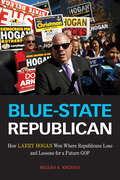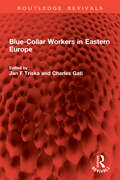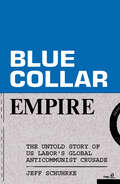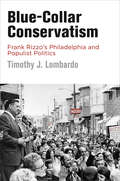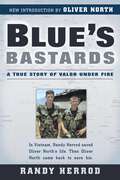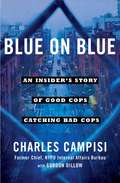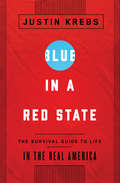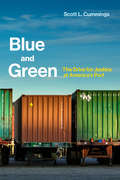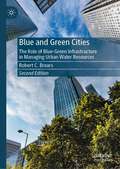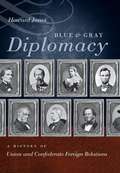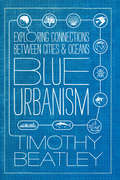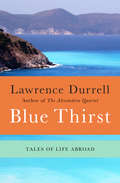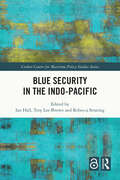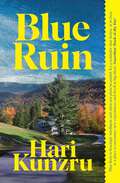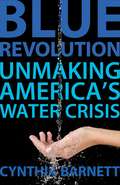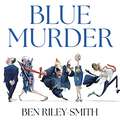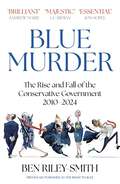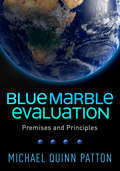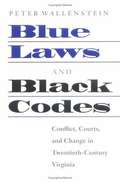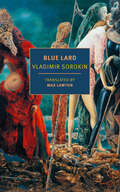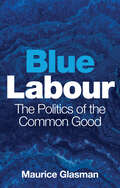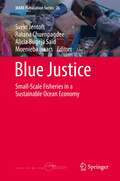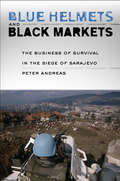- Table View
- List View
Blue-State Republican: How Larry Hogan Won Where Republicans Lose and Lessons for a Future GOP
by Mileah K. KromerLarry Hogan is one of the most popular political figures in the United States today. The two-term Republican governor of Maryland first won his seat after upsetting a favorite of the Democratic political establishment, and then overcame the Trump-driven wave in the heartland of the #resistance to win a second term in 2018. Blue-State Republican is the remarkable story of how his carefully messaged, pragmatic approach to governance helped build a coalition of moderate and conservative Democrats, independents, women, college-educated and Black voters and maintained his GOP base during a time of polarization and negative partisanship. Mileah Kromer takes readers inside Maryland politics to illustrate exactly how Hogan won where Republicans lose and consider whether the un-Trump Republican offers any lessons for how the GOP can win the center-right voters who continue to make up a majority of the country. Kromer conducts interviews with key political leaders and insiders, including Hogan himself, to explain the mechanics of his political success. She also provides a cogent analysis of public opinion polls and focus groups, ultimately showing why the success of a blue-state Republican matters outside of his home state, especially as Hogan considers a 2024 Presidential run.
Blue-Collar Workers in Eastern Europe (Routledge Revivals)
by Charles Gati Jan F. TriskaFirst published in 1981, Blue-Collar Workers in Eastern Europe deals with the attitudes and political disposition of the East European working class. In particular, it provides the first analysis of the growing assertiveness of the industrial proletariat from which East European governments claim to derive their legitimacy, and on whose behalf, they profess to rule. These governments are increasingly hesitant in the use of force, yet they lack the economic means of meeting their workers’ demands.The chapters that make up the book fall into three main categories. About one third are issue oriented and analytical, dealing with the role, economic condition, attitudes, social and demographic characteristics and political involvement of the workers. These are followed by case studies of workers in several countries. Finally, two chapters explore the policy implications of the workers’ new-found assertiveness and assess the international policy options and dilemmas of both the Soviet Union and the West. This book covers all the major issues which brought about the widely publicised workers’ rebellion in Poland in the summer of 1980 and includes an assessment of that crisis and its sequels. It will attract a wide readership among students of the history and politics of Eastern Europe especially those interested in labour unions, socialist management, and comparative communism.
Blue-Collar Empire: The Untold Story of US Labor's Global Anticommunist Crusade
by Jeff SchuhrkeHow the CIA used American unions to undermine workers at home and subvert democracy abroadBlue-Collar Empire tells the shocking story of the AFL-CIO&’s global anticommunist crusade—and its devastating consequences for workers around the world.Unions have the power not only to secure pay raises and employee benefits but to bring economies to a screeching halt and overthrow governments. Recognizing this, in the late twentieth century, the US government sought to control labor movements abroad as part of the Cold War contest for worldwide supremacy. In this work, Washington found an enthusiastic partner in the AFL-CIO&’s anticommunist officials, who, in a shocking betrayal, for decades expended their energies to block revolutionary ideologies and militant class consciousness from taking hold in the workers&’ movements of Europe, Latin America, Africa, and Asia.
Blue-Collar Conservatism: Frank Rizzo's Philadelphia and Populist Politics (Politics and Culture in Modern America)
by Timothy J. LombardoThe postwar United States has experienced many forms of populist politics, none more consequential than that of the blue-collar white ethnics who brought figures like Ronald Reagan and Donald Trump to the White House. Blue-Collar Conservatism traces the rise of this little-understood, easily caricatured variant of populism by presenting a nuanced portrait of the supporters of Philadelphia Mayor Frank Rizzo.In 1971, Frank Rizzo became the first former police commissioner elected mayor of a major American city. Despite serving as a Democrat, Rizzo cultivated his base of support by calling for "law and order" and opposing programs like public housing, school busing, affirmative action, and other policies his supporters deemed unearned advantages for nonwhites. Out of this engagement with the interwoven politics of law enforcement, school desegregation, equal employment, and urban housing, Timothy J. Lombardo argues, blue-collar populism arose.Based on extensive archival research, and with an emphasis on interrelated changes to urban space and blue-collar culture, Blue-Collar Conservatism challenges the familiar backlash narrative, instead contextualizing blue-collar politics within postwar urban and economic crises. Historian and Philadelphia-native Lombardo demonstrates how blue-collar whites did not immediately abandon welfare liberalism but instead selectively rejected liberal policies based on culturally defined ideas of privilege, disadvantage, identity, and entitlement. While grounding his analysis in the postwar era's familiar racial fissures, Lombardo also emphasizes class identity as an indispensable driver of blue-collar political engagement. Blue-Collar Conservatism ultimately shows how this combination of factors created one of the least understood but most significant political developments in recent American history.
Blue's Bastards: A True Story Of Valor Under Fire
by Randy HerrodBlue's Bastards: A True Story of Valor Under Fire by Randy Herrod
Blue on Blue: An Insider's Story of Good Cops Catching Bad Cops
by Gordon Dillow Charles CampisiOne of the most authentic and consistently illuminating portraits of police work ever, Blue on Blue describes the fascinating inner workings of the world’s largest police force and Chief Charles Campisi’s unprecedented two decades putting bad cops behind bars.From 1996 through 2014 Charles Campisi headed NYPD’s Internal Affairs Bureau, working under four police commissioners and gaining a reputation as hard-nosed and incorruptible. When he retired, only one man on the 36,000-member force had served longer. During Campisi’s IAB tenure, the number of New Yorkers shot, wounded, or killed by cops every year declined by ninety percent, and the number of cops failing integrity tests shrank to an equally startling low. But to achieve those exemplary results, Campisi had to triple IAB’s staff, hire the very best detectives, and put the word out that bad apples wouldn’t be tolerated. While early pages of Campisi’s absorbing account bring us into the real world of cops, showing, for example, the agony that every cop suffers when he fires his gun, later pages spotlight a harrowing series of investigations that tested IAB’s capacities, forcing detectives to go undercover against cops who were themselves undercover, to hunt down criminals posing as cops, and to break through the “blue wall of silence” to verify rare—but sometimes very real—cases of police brutality. Told in an edge-of-the-seat way by a born storyteller, Blue on Blue puts us in the scene, allowing us to listen in on wiretaps and feel the adrenaline rush of drawing in the net. It also reveals new threats to the force, such as the possibility of infiltration by terrorists. Ultimately, the book inspires awe for the man who, for almost two decades, was entrusted with the job of making sure the words “New York’s Finest” never ring hollow. A truly revelatory account, Blue on Blue will forever change the way you view police work.
Blue in a Red State
by Justin KrebsImagine if you felt out of step with every other member of the parent association at your kid's school, your quilting circle, or even your workout group. What if casual conversations revolved around Fox News and the decline of American values? How would you feel if you were afraid to put a political bumper sticker on your car or had to think twice about what liberal posts you liked on Facebook? These are just some of the experiences shared by liberals across twenty states and five time zones who tell their stories with honesty, warmth, and humor.Most of us have to "talk across the aisle" once or twice a year--when we're seated next to our conservative out-of-town uncle at Thanksgiving, say. But millions of self- identified liberals live in cities and towns--particularly away from the East and West Coasts--where they are regularly outnumbered and outvoted by conservatives.In this uplifting and completely original book, Justin Krebs, the founder of the national Living Liberally network, speaks with and tells the stories of atheists, vegetarians, environmentalists, pacifists, and old-fashioned liberals--a term he is intent on rehabilitating--from Texas to Idaho, South Carolina to Alaska. Krebs weaves these stories together to create a provocative and rollicking taxonomy of strategies for living in a diverse society, with lessons for every participant in our great democratic experiment.
Blue and Green: The Drive for Justice at America's Port (Urban and Industrial Environments)
by Scott L. CummingsHow an alliance of the labor and environmental movements used law as a tool to clean up the trucking industry at the nation's largest port. In Blue and Green, Scott Cummings examines a campaign by the labor and environmental movements to transform trucking at America's largest port in Los Angeles. Tracing the history of struggle in an industry at the epicenter of the global supply chain, Cummings shows how an unprecedented “blue-green” alliance mobilized to improve working conditions for low-income drivers and air quality in nearby communities. The campaign for “clean trucks,” Cummings argues, teaches much about how social movements can use law to challenge inequality in a global era.Cummings shows how federal deregulation created interrelated economic and environmental problems at the port and how the campaign fought back by mobilizing law at the local level. He documents three critical stages: initial success in passing landmark legislation requiring port trucking companies to convert trucks from dirty to clean and drivers from contractors to employees with full labor rights; campaign decline after industry litigation blocked employee conversion; and campaign resurgence through an innovative legal approach to driver misclassification that realized a central labor movement goal—unionizing port truckers.Appraising the campaign, Cummings analyzes the tradeoffs of using alternative legal frameworks to promote labor organizing, and explores lessons for building movements to regulate low-wage work in the “gig” economy. He shows how law can bind coalitions together and split them apart, and concludes that the fight for legal reform never ends, but rather takes different turns on the long road to justice.
Blue and Green Cities: The Role of Blue-Green Infrastructure in Managing Urban Water Resources
by Robert C. BrearsA completely revised and updated new edition of this successful book focused on urban policy innovations that promote the application of blue-green infrastructure in managing water resources sustainably. Since the first edition published, nature-based solutions in general and blue-green infrastructure, in particular, have become a more recognised solution to various societal challenges, including mitigating climatic extremes in cities while restoring the natural environment and enhancing biodiversity. This new edition provides updated research on urban policy innovations that promote the application of BGI in managing water resources sustainably. In particular, the book contains case studies that illustrate how cities of differing climates, lifestyles and income levels have implemented policy innovations that promote the application of BGI in managing water, wastewater and stormwater sustainably to enhance resilience to climate change and reduce environmental degradation. The seven case studies are leading cities that have implemented various fiscal and non-fiscal policy tools to encourage the implementation of BGI on both public and private property to reduce stormwater runoff volumes, enhance the health of waterways, enhance resilience to climate change and meet regulatory requirements.
Blue and Gray Diplomacy: A History of Union and Confederate Foreign Relations
by Howard JonesIn this examination of Union and Confederate foreign relations during the Civil War from both European and American perspectives, Howard Jones demonstrates that the consequences of the conflict between North and South reached far beyond American soil. Jones explores a number of themes, including the international economic and political dimensions of the war, the North's attempts to block the South from winning foreign recognition as a nation, Napoleon III's meddling in the war and his attempt to restore French power in the New World, and the inability of Europeans to understand the interrelated nature of slavery and union, resulting in their tendency to interpret the war as a senseless struggle between a South too large and populous to have its independence denied and a North too obstinate to give up on the preservation of the Union. Most of all, Jones explores the horrible nature of a war that attracted outside involvement as much as it repelled it. Written in a narrative style that relates the story as its participants saw it play out around them, Blue and Gray Diplomacy depicts the complex set of problems faced by policy makers from Richmond and Washington to London, Paris, and St. Petersburg.
Blue Urbanism: Exploring Connections Between Cities and Oceans
by Timothy BeatleyWhat would it mean to live in cities designed to foster feelings of connectedness to the ocean? As coastal cities begin planning for climate change and rising sea levels, author Timothy Beatley sees opportunities for rethinking the relationship between urban development and the ocean. Modern society is more dependent upon ocean resources than people are commonly aware of--from oil and gas extraction to wind energy, to the vast amounts of fish harvested globally, to medicinal compounds derived from sea creatures, and more. In Blue Urbanism, Beatley argues that, given all we've gained from the sea, city policies, plans, and daily urban life should acknowledge and support a healthy ocean environment. The book explores issues ranging from urban design and land use, to resource extraction and renewable energy, to educating urbanites about the wonders of marine life. Chapters delve into topics like the emerging practices of "community supported fisheries" and aquaponics, incentives for increasing use of wind and tidal energy as renewable options to oil and gas extraction that damages ocean life, and how the shipping industry is becoming more "green. " Additionally, urban citizens, Beatley explains, have many opportunities to interact meaningfully with the ocean, from beach cleanups to helping scientists gather data. Ultimately, he explains that we must create a culture of "ocean literacy" using a variety of approaches, from building design and art installations that draw inspiration from marine forms, to encouraging citizen volunteerism related to oceans, to city-sponsored research, and support for new laws that protect marine health. Equal parts inspiration and practical advice for urban planners, ocean activists, and policymakers, Blue Urbanism offers a comprehensive look at the challenges and great potential for urban areas to integrate ocean health into their policy and planning goals.
Blue Thirst: Tales of Life Abroad
by Lawrence DurrellA pair of lectures from one of the twentieth century&’s most mesmerizing speakersLawrence Durrell was in his early twenties when, tired of the stiffness of London life, he took his family to live in Corfu. Interwar Greece, whose hard beds and mosquito swarms Durrell documented so tenderly in Prospero&’s Cell, was no more. In the first of this pair of lectures, given during a 1970s visit to California, Durrell recalls those days, talking of family, poetry, and the joy of the islands as no other writer can. When war came to the Mediterranean, Durrell was swept into diplomatic service, an adventure he recounts in his second lecture. Though a diplomat of the modern world, he served under men whose experience stretched back to the days before the telephone, when solutions for crises had to be devised by the ambassador, and not phoned in from London. These two lectures on long-vanished worlds are an elegant demonstration of the evocative power of Durrell&’s unmatched storytelling.
Blue Smoke and Mirrors: How Reagan Won and Why Carter Lost the Election of 1980
by Jules Witcover Jack W. GermondA series of election analyses that covers every presidential election in modern history up to Reagan.
Blue Security in the Indo-Pacific (Corbett Centre for Maritime Policy Studies Series)
by Rebecca Strating Troy Lee-BrownThis book advances a holistic conceptualisation of maritime security, under the term ‘Blue Security’, and situates it in states across the Indo-Pacific.The Indo-Pacific encompasses a vast space, incorporating two of the planet’s biggest oceans, the Indian Ocean and Pacific Ocean, as well as littoral and hinterland states home to half the world’s population. Security challenges abound across the maritime Indo-Pacific, ranging from the risk of inter-state war at sea to so-called blue crimes, like piracy, smuggling, and illegal fishing. Climate change and marine pollution, as well as the over-exploitation of scarce and sometimes fragile resources, also pose threats to human security, sustainability, and biodiversity. Using the concept of ‘Blue Security’, this book assesses these various challenges and analyses the approaches to their management used by Indo-Pacific states. It argues that we should embrace a holistic understanding of maritime security, incorporating national, regional, international, human, and environmental dimensions. To that end, it explores the Blue Security strategies of 18 Indo-Pacific states, examining their changing perceptions of threat, their approaches to managing those challenges, and their capabilities. The volume makes an innovative contribution to our knowledge of a region crucial to global security and prosperity.This book will be of interest to students of maritime strategy, security studies, Asian politics and International Relations.The Open Access version of this book, available at http://www.taylorfrancis.com, has been made available under a Creative Commons Attribution (CC-BY) 4.0 license.
Blue Ruin
by Hari KunzruFrom one of the sharpest voices in fiction today, a profound and enthralling novel about beauty, power, and capital's influence on art and those who devote their lives to creating it. 'Blue Ruin is bracingly intelligent and often just plain beautiful. It&’s a reminder that fiction, at its best, is a place to encounter new experiences and dwell in big ideas. Kunzru is known for ambitious novels that bring politics to rich, imaginative life; Blue Ruin shows him at the top of his game.' Sandra Newman, Guardian 'Book of the Day' 'I read everything Hari Kunzru writes, for my highest pleasure and my deepest sustenance.' Rachel Kushner Once Jay was tipped for greatness, a rising star of the London art scene. Now, he lives out of his car and earns money delivery groceries to the wealthy of upstate New York, while all around a terrible pandemic rages. When Jay arrives at a house set in an enormous acreage of woodland, he is shocked to see somebody he thought forever lost to him. Standing on the porch is Alice, a lover from his art school days. Their relationship was tumultuous and destructive, ultimately ending when she left him for his best friend and fellow artist Rob. Alice and Rob have achieved the riches and success for which Jay once seemed destined. Ashamed and debilitated by the virus that has ravaged his body, Jay hopes she won't recognise him behind his dirty surgical mask. When she does, however, she invites him to recover on the property, setting in motion a reckoning decades in the making. Gripping and brilliantly orchestrated, Blue Ruin moves back and forth through time to deliver an extraordinary portrait of an artist as he reunites with his past and confronts the world he once loved and left behind. 'Kunzru's brilliance is his ability to fold vertiginous questions [...] into his storytelling. In its unnerving depiction of [...] uneasy relationships, Blue Ruin not only keeps pace with White Tears and Red Pill, but also confirms his status as a master choreographer of the present moment's creeping anxiety.' Literary Review &“[Blue Ruin] promises to be harrowing and darkly funny. Kunzru has a knack for the nightmarish present, and few things feel more nightmarish than a forced confrontation with the past in the early stages of the pandemic.&” Lit Hub, 'Most Anticipated Books of 2024' &“Kunzru&’s [Blue Ruin] is a triumph of beauty and a true ode to the artist.&” Oprah Daily, 'Most Anticipated Books of 2024' &“Kunzru takes on the excessive and rapacious tendencies of the art world in his dazzling latest . . . [Blue Ruin] is immensely satisfying.&” Publishers Weekly &“A lively, ever-intensifying story of race, immigration, work, and what it means to earn a living . . . [Blue Ruin is] a darkly ironic tale of two bubbles—an art world divorced from economic reality and a Covid era that segregated us from society . . . A dark, smart, provocative tale of the perils of art making.&” Kirkus &“Exquisite writing and keen insights into class tensions and creative dilemmas. Kunzru affirms that it&’s always a good time to live an examined life, even during a pandemic.&” Booklist
Blue Revolution
by Cynthia BarnettFrom backyard grottoes in California to sinkholes swallowing chunks of Florida, Blue Revolution exposes how the nation's green craze largely missed water-the No. 1 environmental concern of most Americans. But the book is big on inspiration, too. Blue Revolution combines investigative reporting with solutions from around the nation and the globe. Reporting from San Antonio to Singapore, long-time journalist Cynthia Barnett shows how local communities and entire nations have come together in a shared ethic to reduce consumption dramatically and live within their water means. The first book to call for a national water ethic, Blue Revolution is also a powerful meditation on water and community in America.
Blue Murder: The Rise and Fall of the Conservative Government, 2010–2024
by Ben Riley-Smith'BRILLIANT' ANDREW MARR'HAD ME OPEN-MOUTHED WITH AMAZEMENT' ED BALLS'ESSENTIAL' JON SOPEL'A GRIPPINGLY WRITTEN, DETAILED BOOK THAT ANSWERS SO MANY QUESTIONS' ISABEL HARDMAN'SUPERB' EVAN DAVISThe explosive full story of the past dozen years of Tory rule, from coalition to self-destruction; fully updated to include the general election. Over the last decade, the British people have seen five different Conservative Prime Ministers, with five different missions and five messages to the nation. From the ashes of a financial crisis, to a break from the EU, to a global pandemic, governments - and ideologies - have changed, but Tory power has clung on. Merciless rebellion and the swift ousting of leaders have enabled this, and yet the same ruthlessness may ultimately bring about their downfall.Witty, hair-raising and brilliantly sourced, Blue Murder links as never before stories of betrayal in Cameron's Coalition, the rifts behind the Referendum, the travails of May, the chaos of the pandemic, the sagas of Johnson, the Truss implosion and the Sunak patch-job.Through his unique access and unmissable inside stories, acclaimed Westminster journalist Ben Riley-Smith's explosive account is essential for anyone wondering how the Tories kept changing, kept revolting - and kept winning. For readers of Tim Shipman and Rory Stewart, this is the first, fullest and frankest story of the entire Tory government.Previously published as The Right to Rule
Blue Murder: The Rise and Fall of the Conservative Government, 2010–2024
by Ben Riley-SmithUPDATED WITH A NEW CHAPTER ON THE 2024 ELECTIONA GUARDIAN AND DAILY TELEGRAPH POLITICS BOOK OF THE YEAR'BRILLIANT' ANDREW MARR'MAJESTIC' GUARDIAN'ESSENTIAL' JON SOPEL'A CRACKING READ' FINANCIAL TIMES'A SHARP INSIDER ACCOUNT' NEW STATESMAN The full inside story of fourteen years of Tory rule, from coalition to self-destruction. In 2010 David Cameron's Conservative Party came into power with a promise of stability. Fourteen years and five prime ministers later, the Tories have been swept away, divided and decimated. What went wrong? From the ashes of a financial crisis to a break from the EU to a global pandemic, prime ministers have changed dramatically while the Tories remained in power. Merciless rebellions and the swift ousting of leaders enabled this, but the same ruthlessness ultimately brought about their downfall. Blue Murder links stories of betrayal in Cameron's coalition, the travails of May, the sagas of Johnson, the Truss implosion and the Sunak spiral. Through his unique access and unmissable inside stories, Ben Riley-Smith's thrilling account is essential for anyone wondering how the Tories carved out the political opportunity of a generation and then tore themselves apart. PREVIOUSLY PUBLISHED AS THE RIGHT TO RULE.
Blue Murder: The Rise and Fall of the Conservative Government, 2010–2024
by Ben Riley-SmithUPDATED WITH A NEW CHAPTER ON THE 2024 ELECTIONA GUARDIAN AND DAILY TELEGRAPH POLITICS BOOK OF THE YEAR'BRILLIANT' ANDREW MARR'MAJESTIC' GUARDIAN'ESSENTIAL' JON SOPEL'A CRACKING READ' FINANCIAL TIMES'A SHARP INSIDER ACCOUNT' NEW STATESMAN The full inside story of fourteen years of Tory rule, from coalition to self-destruction. In 2010 David Cameron's Conservative Party came into power with a promise of stability. Fourteen years and five prime ministers later, the Tories have been swept away, divided and decimated. What went wrong? From the ashes of a financial crisis to a break from the EU to a global pandemic, prime ministers have changed dramatically while the Tories remained in power. Merciless rebellions and the swift ousting of leaders enabled this, but the same ruthlessness ultimately brought about their downfall. Blue Murder links stories of betrayal in Cameron's coalition, the travails of May, the sagas of Johnson, the Truss implosion and the Sunak spiral. Through his unique access and unmissable inside stories, Ben Riley-Smith's thrilling account is essential for anyone wondering how the Tories carved out the political opportunity of a generation and then tore themselves apart. PREVIOUSLY PUBLISHED AS THE RIGHT TO RULE.
Blue Marble Evaluation: Premises and Principles
by Michael Quinn PattonAs a transdisciplinary profession, evaluation has much to offer to global change interventions that work toward a sustainable future across national boundaries, sectors, and issues. This book introduces Blue Marble evaluation, which provides a framework for developing, adapting, and evaluating major systems change initiatives involving complex networks of stakeholders. Michael Quinn Patton demonstrates how the four overarching principles and 12 operating principles of this innovative approach allow evaluators, planners, and implementers to home in on sustainability and equity issues in an intervention. Compelling case examples, bulleted review lists, charts, and 80 original exhibits and graphics connect the global and local, the human and ecological. Rooted in utilization-focused, developmental, and principles-focused evaluation, Blue Marble evaluation is designed to tackle problems outside the reach of traditional evaluation practice.
Blue Laws and Black Codes: Conflict, Courts, and Change in Twentieth-century Virginia
by Peter WallensteinWomen were once excluded everywhere from the legal profession, but by the 1990s the Virginia Supreme Court had three women among its seven justices. This is just one example of how law in Virginia has been transformed over the past century, as it has across the South and throughout the nation.In Blue Laws and Black Codes, Peter Wallenstein shows that laws were often changed not through legislative action or constitutional amendment but by citizens taking cases to state and federal courtrooms. Due largely to court rulings, for example, stores in Virginia are no longer required by "blue laws" to close on Sundays. Particularly notable was the abolition of segregation laws, modified versions of southern states' "black codes" dating back to the era of slavery and the first years after emancipation. Virginia's long road to racial equality under the law included the efforts of black civil rights lawyers to end racial discrimination in the public schools, the 1960 Richmond sit-ins, a case against segregated courtrooms, and a court challenge to a law that could imprison or exile an interracial couple for their marriage.While emphasizing a single state, Blue Laws and Black Codes is framed in regional and national contexts. Regarding blue laws, Virginia resembled most American states. Regarding racial policy, Virginia was distinctly southern. Wallenstein shows how people pushed for changes in the laws under which they live, love, work, vote, study, and shop--in Virginia, the South, and the nation.
Blue Lard
by Vladimir SorokinBlue Lard is an act of desecration. Blue Lard is what's left after the towering masterpieces of Russian literature have been blown to smithereens, the most graphic, shocking, controversial, and celebrated book to be published in Russia since the end of Communism. Denounced as an abomination on publication in 1999—a crowd of angry Putin supporters gathered in front of Moscow&’s Bolshoi Theater to toss shredded copies of Sorokin&’s books into an enormous papier-mâché toilet—this ferocious takedown of Russian greatness has since found its way into the canon of Russian literature itself. The book begins in a futuristic laboratory where genetic scientists speak in a dialect of Russian mixed with Chinese. There they work to clone famous Russian writers, who are then made to produce texts in the style of their forebears. The goal of this &“script-process&” is not the texts themselves but the blue lard that collects in the small of their backs as they write. This substance is to be used to power reactors on the moon—that is, until a sect of devout nationalists breaks in to steal the blue lard, planning to send it back in time to an alternate version of the Soviet Union, one that exists on the margins of a Europe conquered by a long-haired Hitler with the ability to shoot electricity from his hands. What will come of this blue lard? Who will finally make use of its mysterious powers? Max Lawton&’s translation of Blue Lard, the first into English, captures this key work in all its grotesque, havoc-making, horrifying, visceral intensity.
Blue Labour: The Politics of the Common Good
by Maurice GlasmanLabour has been on a wild ride over the past thirty years. New Labour argued that we had no choice but to accept a globalized free market economy in which the race was to the swift, the open and the flexible. Corbynism reacted against this with a jumble of old school statism and identity politics. Both ultimately failed. In this book, Maurice Glasman takes the axe to the soulless utilitarianism and &‘progressive&’ intolerance of both Blair and Corbyn. Human beings, he contends, are not calculating machines, but faithful, relational beings who yearn for meaning and belonging. Rooted in their homes, families and traditions, they seek to resist the revolutionary upheaval of markets and states, which try to commodify and dominate their lives and homes, by the practice of democracy, mutuality and pluralism. This is the true Labour tradition, which is paradoxically both radical and conservative – and more relevant than ever in a post-COVID world. This crisp statement of the real politics of Blue Labour – rather than the absurd caricature of its detractors – is Glasman&’s love letter to the left-conservatism that provides Labour&’s best chance of moral – and indeed electoral – redemption.
Blue Justice: Small-Scale Fisheries in a Sustainable Ocean Economy (MARE Publication Series #26)
by Svein Jentoft Ratana Chuenpagdee Alicia Bugeja-Said Moenieba IsaacsFor small-scale fisheries around the world, the Blue Growth and Blue Economy initiatives may provide sustainable development, but only insofar as they align with the global consensus enshrined in the Voluntary Guidelines for Securing Sustainable Small-Scale Fisheries in the context of Food Security and Poverty Eradication. If states do nothing to fulfill the promises they made when they endorsed these guidelines in 2014, the Blue Economy will come at a loss for small-scale fisheries and further their marginalization in the ocean economy. Under the umbrella of Blue Justice, this book demonstrates that these risks are real and must be considered as states implement their sustainable ocean development plans. These are human rights issues, which are embedded into governance principles and institutions and which make a difference for small-scale fisheries people in their daily lives. In stressing the importance of policies and institutions that build on the experiences of small-scale fisheries people in the contexts in which they operate, this book draws on case studies of small-scale fisheries from countries on all continents to clarify what Blue Justice entails for small-scale fisheries and make suggestions for real change. “Through the Blue Justice paradigm, this book flags the relevance of recognizing the potential impact that different factors, including the Blue Economy approach, could bring to fishing communities, their livelihoods, cultural traditions, and other potential multidimensional conflicts. Vulnerability in fishing communities can increase and inequalities can be reinforced at different levels if individuals and community capabilities are not strengthened… A first of its kind, not to be missed, this book is informative, purposeful, and pertinent in an era of change”. Silvia Salas, CINVESTAV, Marine Resources Department, Mérida, Mexico "The studies reveal that Blue Justice is a ‘governability’ issue, which requires establishing ‘right’ institutions, that are transdisciplinary (integrated), participatory, and holistic. It is implicit from these writings that the SSF Guidelines and Blue Growth initiatives do not form two different discourses, and that the implementation of the former would resolve many of the justice issues caused by the latter, in favor of small-scale fisheries and their communities". Oscar Amarasinghe, Professor & Chancellor, Ocean University of Sri Lanka and President, Sri Lanka Forum for Small Scale Fisheries (SLFSSF)
Blue Helmets and Black Markets: The Business of Survival in the Siege of Sarajevo
by Peter AndreasThe 1992–1995 battle for Sarajevo was the longest siege in modern history. It was also the most internationalized, attracting a vast contingent of aid workers, UN soldiers, journalists, smugglers, and embargo-busters. The city took center stage under an intense global media spotlight, becoming the most visible face of post-Cold War conflict and humanitarian intervention. However, some critical activities took place backstage, away from the cameras, including extensive clandestine trading across the siege lines, theft and diversion of aid, and complicity in the black market by peacekeeping forces.In Blue Helmets and Black Markets, Peter Andreas traces the interaction between these formal front-stage and informal backstage activities, arguing that this created and sustained a criminalized war economy and prolonged the conflict in a manner that served various interests on all sides. Although the vast majority of Sarajevans struggled for daily survival and lived in a state of terror, the siege was highly rewarding for some key local and international players. This situation also left a powerful legacy for postwar reconstruction: new elites emerged via war profiteering and an illicit economy flourished partly based on the smuggling networks built up during wartime.Andreas shows how and why the internationalization of the siege changed the repertoires of siege-craft and siege defenses and altered the strategic calculations of both the besiegers and the besieged. The Sarajevo experience dramatically illustrates that just as changes in weapons technologies transformed siege warfare through the ages, so too has the arrival of CNN, NGOs, satellite phones, UN peacekeepers, and aid convoys. Drawing on interviews, reportage, diaries, memoirs, and other sources, Andreas documents the business of survival in wartime Sarajevo and the limits, contradictions, and unintended consequences of international intervention. Concluding with a comparison of the battle for Sarajevo with the sieges of Leningrad, Grozny, and Srebrenica, and, more recently, Falluja, Blue Helmets and Black Markets is a major contribution to our understanding of contemporary urban warfare, war economies, and the political repercussions of humanitarian action.
